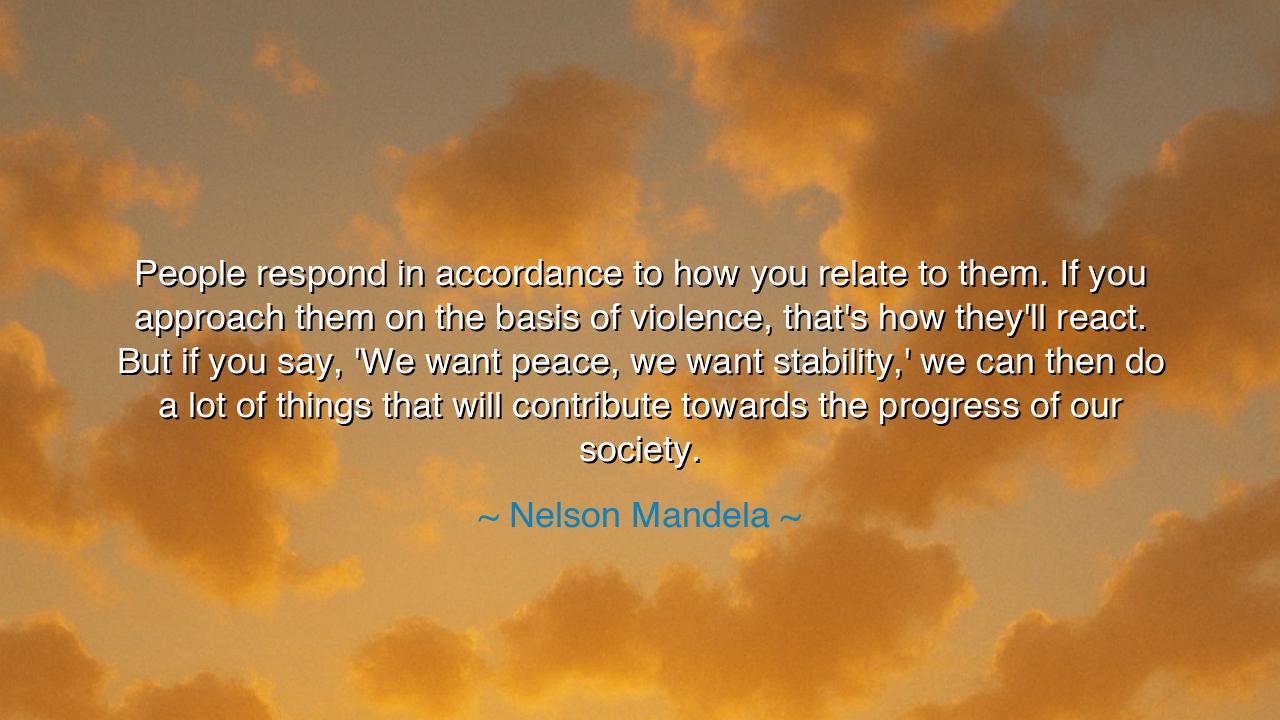
People respond in accordance to how you relate to them. If you
People respond in accordance to how you relate to them. If you approach them on the basis of violence, that's how they'll react. But if you say, 'We want peace, we want stability,' we can then do a lot of things that will contribute towards the progress of our society.






Hear the voice of Nelson Mandela, forged in the furnace of struggle and tempered by the wisdom of endurance: “People respond in accordance to how you relate to them. If you approach them on the basis of violence, that’s how they’ll react. But if you say, ‘We want peace, we want stability,’ we can then do a lot of things that will contribute towards the progress of our society.” These words, born of suffering and hope, are not the counsel of one who lived in ease, but of a man who endured chains, humiliation, and the weight of an entire nation’s dream. They are a testament to the eternal law of human interaction: that the spirit in which you meet others becomes the spirit they return to you.
Mandela knew this truth because he had lived its opposite. For decades, South Africa groaned under the yoke of apartheid. The rulers approached the oppressed not with respect, but with violence—and violence was the fruit they reaped. Rage grew, bitterness spread, and the nation teetered on the edge of endless bloodshed. Mandela himself, once a young firebrand, was not immune to the lure of retaliation. Yet in the long silence of his imprisonment, he came to see that if the people were to escape endless cycles of revenge, they must be led by a higher principle: the call to peace and stability, not as submission, but as the path to true liberation.
History abounds with examples that confirm this law. When Rome crushed its enemies with cruelty, it bred rebellion after rebellion. But when it extended citizenship and dignity, many conquered peoples became Rome’s strongest allies. When leaders wield the sword first, they find themselves surrounded by blades. When they extend the hand of reconciliation, they often find bridges where walls once stood. This is what Mandela reminds us: people respond to the treatment they receive. Approach them with domination, and you awaken their resistance. Approach them with dignity, and you awaken their humanity.
Consider the miracle of South Africa’s peaceful transition in the 1990s. The nation stood at the brink of civil war; blood had already been spilled in rivers. Yet Mandela, freed after twenty-seven years in prison, did not call for vengeance. He called for peace, for reconciliation, for the building of a shared society where all races could find a home. He met his former jailers not with hatred, but with forgiveness. He even invited his oppressors to the table of nation-building. The world watched in awe as a land that should have burned in civil conflict instead took its first steps toward progress. This was no accident—it was the living proof of his words.
The meaning of his teaching is clear: violence begets violence, while peace opens the path to creation. This does not mean passivity, nor surrender to injustice. It means choosing the higher ground, resisting the temptation to answer hatred with hatred. It means refusing to mirror the cruelty of the oppressor, and instead shaping a vision of a shared future that disarms enmity. It is the hardest path, for it requires patience, discipline, and a heart larger than one’s wounds. But it is the only path that leads to lasting stability and true progress.
The lesson for us, then, is both personal and collective. In our daily lives, when insulted, do we answer with insult? When wronged, do we repay with bitterness? If we do, we trap ourselves in endless cycles of conflict. But if we answer with calm, with dignity, with the desire for peace, we create space for reconciliation and growth. On the scale of nations, when we confront injustice, we must demand change firmly but not with a spirit of annihilation. For only in creating a future where all have a stake can a society truly flourish.
What, then, must we do? Speak the language of peace even when surrounded by noise of strife. Choose reconciliation where vengeance beckons. Build bridges, even when easier to burn them. Teach our children that true strength lies not in domination, but in the discipline of compassion. And never forget that people respond not only to the weapons in our hands, but to the spirit in our hearts.
Thus remember: Mandela’s words are not the musings of an idealist, but the strategy of a realist who transformed his nation. If we want progress, if we want society to endure, we must choose the way of peace. For it is only in peace that human beings can build, create, and rise together into the fullness of their destiny.






AAdministratorAdministrator
Welcome, honored guests. Please leave a comment, we will respond soon